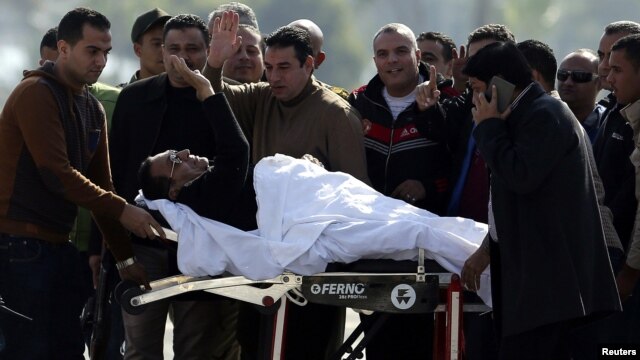Egypt police disperse protest after Mubarak ruling
| Publisher | Radio Free Europe/Radio Liberty |
| Publication Date | 29 November 2014 |
| Cite as | Radio Free Europe/Radio Liberty, Egypt police disperse protest after Mubarak ruling, 29 November 2014, available at: https://www.refworld.org/docid/54be1278c.html [accessed 29 May 2023] |
| Disclaimer | This is not a UNHCR publication. UNHCR is not responsible for, nor does it necessarily endorse, its content. Any views expressed are solely those of the author or publisher and do not necessarily reflect those of UNHCR, the United Nations or its Member States. |
November 29, 2014
By RFE/RL
 Former Egyptian President Hosni Mubarak waves to his supporters as he returns to Maadi military hospital in Cairo on November 29.
Former Egyptian President Hosni Mubarak waves to his supporters as he returns to Maadi military hospital in Cairo on November 29.
Egyptian police have used water cannon and tear gas to disperse more than 1,000 demonstrators in central Cairo.
The protesters gathered near Tahrir Square in the evening of November 29 to voice their opposition to a court decision to drop charges against ousted President Hosni Mubarak and seven former top security commanders over the killing of 239 protesters during the 2011 uprising against him.
Liberal opponents of Mubarak were joined by supporters of the banned Muslim Brotherhood.
The Interior Ministry said police dispersed the rally after Brotherhood activists started throwing stones.
Two people were reported killed in the clashes.
Mubarak, 86, was also acquitted of corruption charges that he faced along with his sons, Alaa and Gamal.
Relatives of those killed reacted with anger to the court's handling of the case, while the courtroom erupted in cheers when the judge delivered the verdict.
Mubarak's lawyer, Farid al-Deeb, said it was a "good ruling that proved the integrity of Mubarak's era."
In a television interview after the ruling, Mubarak said he did "nothing wrong."
The former president, who denies the charges against him, is being held under house arrest in a military hospital in Cairo.
He is serving a separate three-year sentence for embezzlement of public funds.
In all, nearly 900 protesters are thought to have been killed in the weeks before Mubarak resigned in February 2011.
Mubarak, his former Interior Minister Habib al-Adly, and six others had been convicted of conspiracy to kill and were sentenced to life in prison in June 2012.
But in January 2013, an appeals court overturned the sentence on a technicality.
Mubarak's elected successor, Muhammad Morsi, stayed a year in power before being ousted by the military in July 2013 during mass anti-government protests.
The former army chief, Abdel Fattah al-Sisi, was subsequently elected in his place.
With reporting by AP and AFP
Link to original story on RFE/RL website
